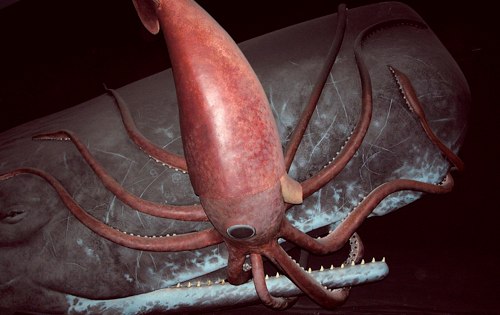New Study Classifies Colossal Squid As Pretty Lazy
Posted by Justin on May 10th, 2010
The myth of the colossal squid as a fearsome aggressive predator has been sunk…
Measuring longer than a school bus and sporting tentacles covered in razor-sharp hooks, the colossal squid is the stuff of nightmares. However, new research suggests the enormous sea creature may not be the fierce hunter of legend.
This finding not only upends science’s understanding of the squid itself, but forces a reevaluation of its role in the entire ecosystem where it lives some 3,000 to 6,000 feet (914 to 1,830 meters) beneath the Antarctic sea.
This new view of the colossal squid comes from data analysis made by marine biologists Rui Rosa, of the University of Lisboa, Portugal, and Brad Seibel, of the University of Rhode Island. Rosa and Seibel looked at the relationship between metabolism (how the body’s cells turn food into energy) and body size for smaller squids in the same family and used the information to predict the metabolism of the colossal squid (Mesonychoteuthis hamiltoni).
(The so-called giant squid belongs to the genus Architeuthis, a different group of animals from the colossal squid.)
They found, the squid would’ve had a slower metabolism and so moved slower than expected, waiting for prey, rather than running it down. “Everyone thought it was an aggressive predator, but the data suggests otherwise,” Rosa told LiveScience. “It’s a squid that weights half a ton with hooks in its tentacles, but our findings show it’s more like just a big blob.”
And lo, the reconfiguring of the Giant Squid’s reputation begins. Out with the “menacing death machine”, in with the “lovable fatso”. The Hurley of the sea.